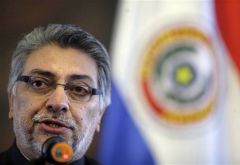By William Miller
Impunity Watch Reporter, North America
GUANTANAMO BAY, Cuba – Canadian Citizen Omar Khadr was not present for the second day of hearings to decide if any of the evidence against him should be suppressed. Khadr who was just fifteen when he was arrested in Afghanistan is to be tried for war crimes in a military tribunal. He decided to boycott the proceedings because military officials required him to wear sensory deprivation equipment while he was being transported from the jail to the court house.

Khadr was born in Canada to Al Qaeda supporters. He was taken to Afghanistan when he was just ten. During his time in Afghanistan he stayed in Al Qaeda camps and assisted in building road side bombs.
Khadr was just fifteen years old when he was arrested by U.S. Forces in Afghanistan for allegedly throwing a grenade that killed a United States medic. Prosecution witness FBI agent Robert Fuller testified to an account of the incident he says Khadr gave him when he was sixteen.
“He said one of the Afghan locals was running toward their compound yelling, ‘The Americans are coming. At that time he remembers (they gathered) up personal effects — the video camera and some film — placed them into duffel bags and then (tried) to exit the compound, where they engaged U.S. forces.”
Fuller further testified that Khadr told him how he watched as the three men he exited the compound with were gunned down by U.S. Forces. Fuller then said Khadr told him he “then he retrieved a grenade, threw the grenade over the compound wall, and then said he passed out.” Khadr presumably passed out from injuries he incurred during the conflict.
Fuller said he never read Khadr his rights during the interview but defended this position saying it was FBI policy not to and that the conversations were not coercive.
Khadr refused to appear at his hearing on Thursday, April 29 after guards required him to wear earmuffs and goggles during transport which were designed to block out his sight and hearing. Although he had complained of an eye problem earlier in the day this was not why he refused the to wear them. He said that the goggles and earmuffs were humiliating.
Khadr’s lawyer, Barry Coburn said this was the first time he was forced to wear such equipment. Coburn said Khadr had only been required to wear them until he was secured in a windowless transport in the past but guards had forced him to wear them for the entire trip as an unnecessary form of punishment.
Military Judge Col. Patrick Parrish originally held that Khadr had knowingly and voluntarily waived his right to appear and started the proceedings without him. After a short recess however he returned and said no one had ever advised Khadr of his right to appear and the consequences of not doing so. He ordered Khadr to be forcibly brought to the courthouse to be advised of his rights unless his defense attorney could persuade him to do so voluntarily.
The hearing Khadr has boycotted is being held to determine if confessions given by Khadr should be suppressed because they were elicited through torture. Khadr has been interrogated more than 100 times during his imprisonment. The defense also seeks to suppress a video tape of Khadr participating in the building of a roadside bomb.
Khadr who is now twenty-three has spent more than a third of his life in prison. If he is convicted he could be sentenced to life. Khadr’s attorneys say that they will appeal any decision to allow Khadr’s confessions to be used as evidence. The case has inflamed many activists who believe Khadr should be considered a child soldier and rehabilitated and sent back home to Canada.
For more information, please see:
Globe and Mail – Khadr Absent from Day Two of Hearings – 29 April 2010
Vancouver Sun – Khadr Boycotts Proceedings at Guantanamo Bay – 29 April 2010
Washington Post – Military Tribunal Opens Hearing on Guantanamo Detainee Omar Khadr – 29 April 2010

